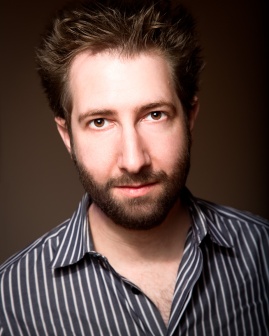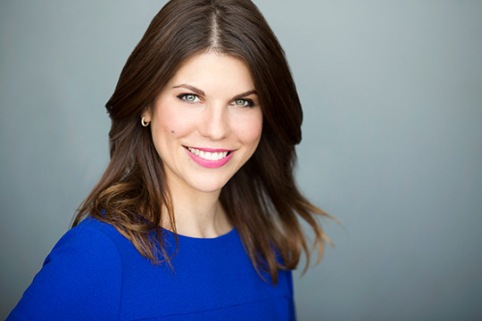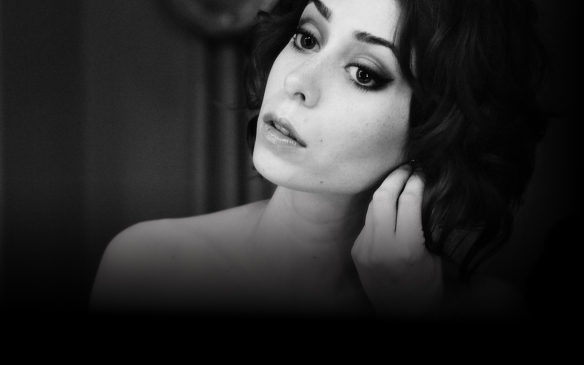The Broadway Warm-Up sits down with Sam Carner, one half of the dynamic songwriting duo Carner & Gregor. Sam Carner won the 2015 Kleban Prize for Most Promising Librettist. Sam and composer Derek Gregor won the 2014 John Wallowitch Award for songwriters under 40, a 2016 MAC Award for “Best Comedic Song” (and eight of their songs have been nominated for MAC Awards), were included in Playbill.com’s twelve “Contemporary Musical Theatre Songwriters You Should Know,” and were in residence at the Goodspeed Festival of New Musicals in January. Seven of their songs have been nominated for MAC Awards, and their work is performed in hundreds of venues around the world every year and has been sung on all seven continents.
Our conversation was thorough between bites of our exquisite Ethiopian cuisine (my first time trying Ethiopian couldn’t have been better – thanks Awash Ethiopian Restaurant), so I’ve split the interview into two parts.
PART I covers topics such as:
* Sam’s background, early influences and mentors
* Navigating the art of collaboration with Derek Gregor
* The impact of YouTube, social media on new musical theater
* The craft of lyric writing
Enjoy and come back for Part II!

What was your first exposure to theatre? When did you know it was what you wanted to pursue as a career?
I first discovered theater as a small child. I grew up in Maine, and my parents took me to Maine State Music Theatre in Brunswick, back when it was called Brunswick Music Theatre. I saw a production of ANNIE GET YOUR GUN. I was six, and that was where I first really caught the bug. We went back to see a show every summer. We watched lots of movie musicals when I was a kid. Now I realize that I didn’t actually think of them as musicals. I didn’t think of MY FAIR LADY as inherently different from SLEEPLESS IN SEATTLE.
Just another movie, another story.
Another story. Sometimes I questioned, “Why doesn’t this one have singing?”
So, that was my early youth. There were school plays when I was ten, eleven. When I was eleven or so I wrote a long children’s story — The Children’s Theatre of Maine had a Young Playwrights Contest, so my dad suggested I turn this story into a musical. It ended up winning, and I wrote a children’s musical that had a bunch of performances in the Greater Portland area.
Wasn’t Anna Kendrick in some of the first shows you wrote?
Yeah, a couple times when we were kids. She did a reading of a show I was working on at Portland Stage Company, and before that, before her Tony Nomination, she did a little twenty minute musical I wrote for The Maine Festival. She always had that incredible presence – she was a star so clearly. I first saw her in a community theater production of GYPSY, and she was Baby June. I remember being like, “Who is that girl?!”
Who are your influences? Mentors? What did you learn in particular from them that was instructive?
The director of the Children’s Theater, Lisa DiFranza, created an incredible environment. She took everyone seriously as creative artists. She also fostered an environment where all ages were welcome, so there were 6 year olds and 10 year olds and 17 year olds and grown-ups in these casts. There was a real kind of mentorship going on, but we were all creating together, and that was inspiring — to feel that you were not being treated as a kid, but you were being taken seriously.
My mom was an artist, my dad was an English professor — so we talked a lot about dramatic structure. My teachers let me pursue the things I was interested in. They weren’t trying to make me stick to a particular curriculum. One teacher let me work on this long story as a project instead of making me stick to the assignment. I wanted to finish it, so she let me do it.
When you’re allowed to pursue something that really excites you, you end up getting a lot more out of it than doing what you HAD to.
Exactly. Another teacher in 10th grade — We were studying the Greek Classics.
The Odyssey and Oedipus. Initially one of the assignments was to do something creative. I wrote a song based on Oedipus called It Was Good While It Lasted In Thebes. which went very well so she let me continue to do that with other projects. I then did a whole cycle of comic songs based on Greek mythology.
You went to Yale, yes? What did you study there?
I actually did a self designed major called “Music, Verse and Drama.” I had a coherent plan, so they let me do it. It was essentially looking at music in isolation, verse in isolation, and theater/drama in isolation, then looking for points of intersection. I took a lot of Music Theory which has definitely served me, and Music History. A lot of dry poetry which has its own kind of music. I also took courses on opera where they all come together. Opera History, Musicology. I also took music theory courses on Gershwin and Cole Porter.
That seems like a very well rounded way to prepare you for what you would later do.
Oh yeah, it was incredibly valuable. I find a lot of inspiration in Renaissance and Romantic poetry. There are a lot of moments in my songs that are kind of callbacks to Keats or John Donne. For instance, our song Stay Awhile is loosely inspired by a John Donne poem called The Sun Rising, which is a poem where a guy in bed with his lover chastises the sun for interrupting their slumber.
Very cool. I would never have known that.
When you take something and put in a totally new context, the original context may disappear, but that’s where it comes from.
That leads me to my next question – Where do you usually start from? The music or the lyrics?
I like to say it starts with a problem to be solved. No element will get too far ahead of the others, but the first question is, “Why are we writing this song?” Is the key thing to fit the situation and get the characters from point A to point B? Do we need a big belty song for the female lead because she doesn’t have enough material in the second act and we need an energy boost? Then we need to justify it. What do we do in order to solve our problem?
Once we have a sense of what we are trying to do, Derek will start fooling around with musical fragments, and I’ll start fooling around with phrases. One of those will usually come first, and then inspire the other.
You met Derek at NYU’s Graduate Musical Theatre Writing Program. Were you paired up together or how did that work?
We were paired together for a four week project. A 20 minute musical, one-act show. it was fortunate that we had that time because we found our collective voice in the second week.
And at the end of those four weeks you realized you worked well together?
It ended up being a really good collaboration. It was considered one of the more effective pieces of that assignment. So we chose each other for the second year.
Considering your work as a whole, how do you feel you have personally changed as writers, from, for instance, UNLOCK’D to TOAST? How has your relationship changed over the years?
I think that we’ve learned a lot by being exposed to the others’ references. When we venture into a style one is less familiar with the other can take the lead. And it’s a chance for the other to learn about the style.
I first discovered your songs years ago through YouTube. How important do you think YouTube is to new musical theater composers? What has your experience been with social media to promote your work?
It’s a game changer. The fact that you can have people doing your songs thousands of times a year even without a Broadway show — It has led to all sorts of opportunities and chances to develop our work at colleges, and with groups across the world. It’s a way of disseminating the material, and allowing the material to have a life even if it’s not being performed at that particular moment. And it leads to more sheet music sales which makes it easier for us to support ourselves as artists.
What’s the benefit/danger of making scores available online?
I think we’re concerned that the stuff we put out into the world is still in development. The moment there’s a definitive version is very late in the game, and for that reason we’ll send out updates when we make changes to songs. If there’s anything that I wish some of the current sheet music platforms allowed for, it’d be that. The ability to send out revisions.
Occasionally, one of the things that happens when you put the music out — you learn about what’s not communicating off the page. Someone will make a really smart, interesting choice, and that will get put into the score one way or another. That’s exciting. In certain cases if someone does something really clever you’ll see other people start copying. Sometimes our directors will use what those performers give them.
Very cool. How does it feel seeing your work performed on YouTube by people you’ve never met? How does it feel knowing that something created in your living room is being performed who knows how far away? What is that like for you?
It’s mostly exciting and gratifying. It’s meant to be performed live. Although the record is not live, the performances pretty much are. Sometimes it’s slightly crushing if a joke is being sold in a way that doesn’t make any sense, but you kinda have to let that go. Mostly it’s exquisite, it’s why you do it. You do it to reach out and talk about things that are on your mind, and that’s kinda the point, that’s why we’re doing this, so it’s very cool.
What is the trickiest part of lyric writing? Connecting music and lyrics? How packed or loose you make the lyric?
The biggest key to lyric writing is placing the song correctly. It’s figuring out what work the song needs to do in the structure of the story. Lyric writing is part of book writing. We’ve all seen songs where someone is convincing someone of something they already know or something they’re clearly not going to succeed in convincing them of, or espousing a point of view, but to no dramatic effect. That ends up causing an audience member to tune out. As a writer you have to ask the same questions you ask an actor. What is making this active? What is my action with this moment in the song? Ideally that should lead, inevitably, to another action. The better you do at placing the song and figuring out what work it needs to do, the less work you have to do in writing it.
Is that something you learned at school or by process of doing or based on how the audience responds?
I think I felt my way there gradually. Working one on one with actors, I’d write something that wasn’t particularly active, but felt like it needed to be. Maybe I put pressure on the performer to make it active. Then I’d realize I wasn’t doing my job as much as I could. Let me take the pressure off – write in some of the tension – and make it easier for the performer to make it dynamic.
Letting the lyrics do the job for you. The actor doesn’t have to push for emotion, or create anything, the moments just happen?
Right. I didn’t want the actor to have to push or create something that isn’t supported by the text at all. I want the situation and path of the song to allow for a cocktail of emotions. The subtleties and intensities should already be there to be explored. There needs to be an undertow. It needs to be there. In a solo that’s what creates dramatic tension. I’m going to write in some of that complication.
How do you lay the trail for the listener to follow while at the same time staying slightly ahead of the audience?
That’s one of the big challenges in writing lyrics. It’s happening in real time and there’s a lot of distractions. People can only perceive so much. So, it’s working and trying things.
You have to trust that the audience is smart. You don’t want to write down to them, but you also need to give them time to digest.
I’m always a little surprised by what is obvious with minimal statement, and what takes ten statements to actually make the point. It’s never entirely predictable to me. That’s something you can only do through the rehearsal process, through trying it out with audience members. Sometimes the action or the situation does so much of the work for you.
What have you learned about yourself and others by writing your characters? Have you developed a broader understanding of people in general?
There’s a principle in psychology called the “fundamental attribution error,” which is the tendency to over-attribute your own actions to situation and circumstance and over-attribute other people’s actions to their inherent character. So, “I got a speeding ticket because my grandma was having a heart attack, and I needed to get her to the hospital! YOU got a speeding ticket because you’re a lousy speeder!” There are more positive ways of putting it, but I think that delving into characters that are very different but have very similar basic motivations, you learn to understand…You learn your own capacity to do many different things that you might judge differently if you looked at them from a different perspective, and you come to have a certain tolerance and understanding of the people you encounter in life.
It creates compassion.
I think so, I hope.
FOLLOW CARNER & GREGOR
Website | Twitter | Facebook | Instagram


 Like this post? Check out more of our
Like this post? Check out more of our  Last Friday, I had the great privilege of seeing
Last Friday, I had the great privilege of seeing 